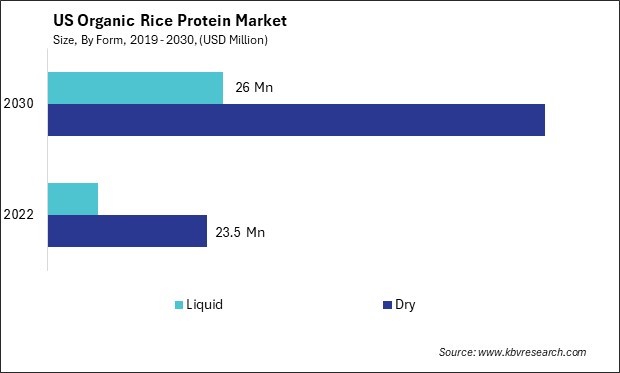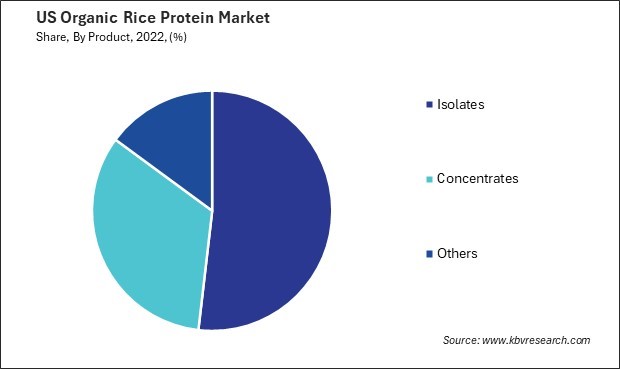Int'l : +1(646) 832-2886 | query@kbvresearch.com
Int'l : +1(646) 832-2886 | query@kbvresearch.com
Published Date : 15-May-2024 |
Pages: 53 |
Formats: PDF |
The United States (US) Organic Rice Protein Market size is expected to reach $99.5 Million by 2030, rising at a market growth of 15.9% CAGR during the forecast period. In the year 2022, the market attained a volume of 2056.2 Tonnes, experiencing a growth of 12.7% (2019-2022).
The organic rice protein market in the United States has experienced significant growth in recent years, driven by increasing consumer demand for plant-based protein sources and a growing awareness of health and sustainability. One of the key drivers of the organic rice protein market in the U.S. is the rising interest in plant-based diets. Consumers seek alternatives to traditional animal-based protein sources driven by health considerations, ethical concerns, and environmental awareness.

The demand for organic products has grown in the U.S., with Americans prioritizing organic choices for health and environmental reasons. Organic rice protein aligns with this trend, as it is produced without synthetic pesticides, herbicides, or genetically modified organisms (GMOs). Organic rice protein, derived from brown rice, is gaining popularity as a viable plant-based protein option due to its nutritional profile and suitability for various dietary preferences, including vegan and gluten-free.
The 2021 Organic Survey results from the U.S. Department of Agriculture's National Agricultural Statistics Service (NASS) reveal a significant uptick in the organic sector, showing a notable increase of $1.28 billion, or 13%, in total organic product sales compared to 2019, totaling $11.2 billion. California stands out as the frontrunner in certified organic sales, contributing $3.55 billion, representing 32% of the national total. As consumers increasingly seek plant-based protein sources, organic rice protein has carved its niche, offering a clean, allergen-free, and environmentally friendly option. This trend is not only contributing to the overall expansion of the organic sector but also reshaping the landscape of protein consumption in the United States.Top of Form
The COVID-19 pandemic has played a role in shaping the organic rice protein market in the U.S. The pandemic led to increased health consciousness among consumers, fostering a greater interest in products that support overall well-being. Additionally, disruptions in the supply chain and concerns about food safety prompted consumers to scrutinize the source and quality of their food, further fueling the demand for organic and plant-based options.
In recent years, the organic rice protein market in the United States has witnessed a significant surge in demand, particularly among athletes seeking high-quality, plant-based protein sources. American athletes are turning to organic rice protein as a valuable alternative to traditional protein supplements derived from animal sources. Various factors drive this shift, including a rise in plant-based diets, environmental consciousness, and concerns about the potential health risks of certain animal-based protein products.
One key driving force behind the heightened demand is the nutritional profile of organic rice protein. Athletes are drawn to its complete amino acid profile, making it an ideal source of essential amino acids for muscle recovery and overall performance. Additionally, organic rice protein is free from common allergens such as dairy and soy, addressing the needs of individuals with dietary restrictions or sensitivities.
The emphasis on organic sourcing adds another layer to the appeal. U.S. consumers are increasingly prioritizing products that are plant-based and produced using environmentally sustainable and pesticide-free practices. This aligns with the broader consumer trend toward cleaner and more ethically sourced food options.
In response to this surge in demand, the industry has witnessed a proliferation of organic rice protein products tailored specifically for athletes. These products often come with marketing messaging highlighting their organic certification, non-GMO status, and minimal processing to cater to the discerning preferences of the target demographic. Hence, the surging demand for organic rice protein in the United States, driven by athletes' preference for plant-based, allergen-free, and environmentally sustainable options, reflects a shift towards cleaner and ethically sourced protein supplements.
In the dynamic landscape of the U.S. organic rice protein market, there has been a noticeable surge in demand for rice protein isolates, reflecting a growing preference among American consumers for plant-based protein sources. This trend is particularly pronounced in the organic sector, where health-conscious U.S. consumers seek sustainable and clean-label alternatives. One key driver behind the rising demand for rice protein isolates is the increasing adoption of plant-based diets and the emphasis on sustainability. U.S. consumers gravitate towards organic rice protein as it aligns with their desire for ethically sourced and environmentally friendly products.
Moreover, rice protein isolates are gaining traction due to their versatility and wide-ranging applications in the food and beverage industry. They are incorporated into various products, such as plant-based protein powders, nutrition bars, and meat alternatives. This adaptability caters to U.S. consumers' diverse preferences for plant-based protein options that seamlessly integrate into their daily diets.
The U.S. industry's emphasis on health and wellness is another factor driving the demand for rice protein isolates. With an increasing number of Americans prioritizing fitness and overall well-being, organic rice protein products are perceived as an appealing choice to support these lifestyle goals. Thus, the surge in demand for organic rice protein isolates in the U.S. reflects a growing preference for plant-based, sustainable, and clean-label alternatives, driven by the increasing adoption of plant-based diets, emphasis on sustainability, and the versatile applications of rice protein in various food and beverage products.

The organic rice protein market in the United States has grown substantially in recent years, driven by increasing consumer demand for plant-based protein alternatives. Several companies have emerged as key players in this industry, capitalizing on the growing trend towards healthier and sustainable food choices. These companies play a crucial role in shaping the organic rice protein market landscape in the U.S.
One prominent player in the U.S. organic rice protein market is Nutribiotic, which specializes in producing organic and non-GMO nutritional supplements. Nutribiotic offers a range of organic rice protein powders that cater to the rising demand for plant-based protein sources. The company's commitment to quality and sustainability has positioned it as a leading choice among health-conscious consumers seeking organic alternatives.
Another significant contributor to the U.S. organic rice protein market is Axiom Foods. Axiom Foods is known for its Oryzatein® organic brown rice protein, which has gained popularity for its high protein content and nutritional benefits. The company focuses on sustainable and eco-friendly practices in its production processes, aligning with the increasing consumer preference for ethically sourced and environmentally friendly products.
Growing consumer awareness about the benefits of organic and non-GMO products has also propelled the success of Growing Naturals in the U.S. The company offers organic rice protein isolate, emphasizing its nutritional value and suitability for various dietary preferences, including vegan and gluten-free diets. The brand's commitment to transparency and clean labeling resonates well with consumers seeking trustworthy and health-conscious options.
Orgain, a well-known player in the organic food and beverage industry, has made significant strides in the organic rice protein market in the U.S. The brand's organic protein powders, including rice protein formulations, have gained popularity among fitness enthusiasts and individuals seeking clean and nutritious protein sources. The company's broader focus on organic and clean-label products aligns with the prevailing consumer preferences in the health and wellness sector.
NOW Foods has also established itself as a noteworthy player in the U.S. organic rice protein market. NOW Foods offers diverse organic and non-GMO products, including rice protein powders. The company's commitment to quality control and adherence to industry standards has contributed to its reputation as a reliable source of organic rice protein supplements.
As consumers increasingly seek plant-based protein alternatives, the U.S. organic rice protein market has witnessed the entry of smaller, niche players. These companies, such as Sunwarrior, produce innovative and specialized organic rice protein products to cater to specific dietary needs. Sunwarrior, for instance, emphasizes raw and sprouted rice protein formulations, appealing to consumers interested in minimally processed and nutrient-rich options. As the industry continues to expand, these companies will likely play a pivotal role in shaping the future of organic rice protein consumption in the United States.
By Form
By Product
By Application